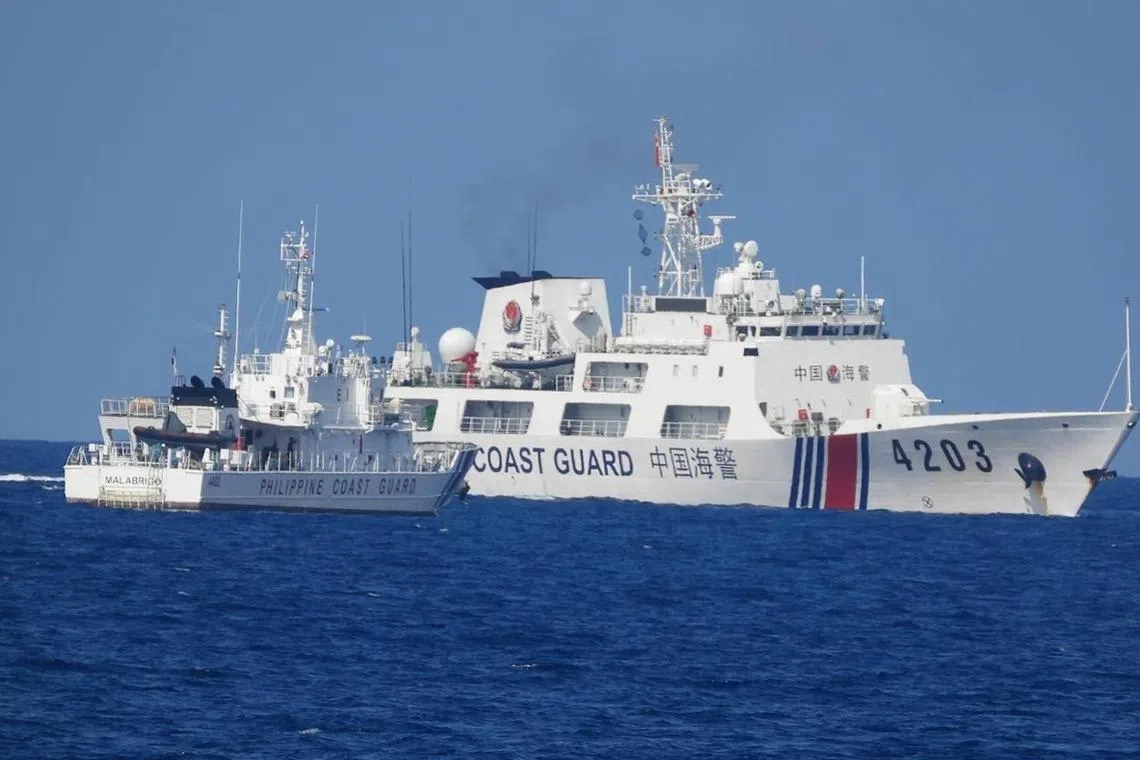China harassed and obstructed resupply mission ships in Spratlys: Philippine Coast Guard
Sign up now: Get insights on Asia's fast-moving developments

A Chinese Coast Guard vessel blocking the Philippine Coast Guard's BRP Malabrigo in the South China Sea on June 30.
PHOTO: PHILIPPINE COAST GUARD
MANILA – The Philippine Coast Guard (PCG) has accused its Chinese counterpart of shadowing and harassing two ships escorting boats on a resupply mission for Philippine Navy troops stationed at the Second Thomas Shoal in the disputed South China Sea.
PCG spokesman Jay Tarriela on Wednesday said the China Coast Guard (CCG) conducted “aggressive actions” against the BRP Malabrigo and the BRP Malapascua last Friday while the ships were escorting boats sending supplies to the BRP Sierra Madre.
The BRP Sierra Madre is a decrepit World War II-era Philippine Navy ship that was intentionally grounded in the Second Thomas Shoal in the Spratly Islands in 1999 to help reinforce Manila’s sovereignty claims over the disputed waterway.
“It appears that the Chinese coast guard vessels were exerting additional effort to prevent the PCG from reaching Ayungin Shoal,” Commodore Tarriela said, using Manila’s term for the shoal.
He said PCG ships were “constantly followed, harassed, and obstructed” by the larger CCG vessels, which manoeuvred within about 90m of the Philippine ships and attempted to “obstruct passage and discourage” them from reaching Second Thomas Shoal.
He said the PCG also spotted two Chinese Navy ships near the shoal, which is located within the Philippines’ 200-nautical mile exclusive economic zone (EEZ).
“This is particularly alarming, as the Philippine Navy’s naval operation is solely humanitarian in nature. Despite this, the Chinese have deployed their warships, raising even greater concerns,” said Commodore Tarriela.
The Straits Times has contacted the Chinese Embassy for comment.
Despite the encounter, the resupply mission for the BRP Sierra Madre was a success, and the Philippine ships returned to their respective areas of operation safely.
Last Friday’s incident was the latest tense maritime encounter between the Philippines and China, which have competing claims over the South China Sea. Brunei, Malaysia, Taiwan and Vietnam also have claims in the waterways.
In 2016, Manila won its historic arbitral case against Beijing,
China, however, has refused to recognise the ruling and has ramped up its military and artificial island-building activities in the disputed sea. Over the years, Chinese vessels have also blocked Filipino ships and fishermen from accessing the area.
Senator Risa Hontiveros, who has often spoken out against Chinese incursions in the South China Sea, has urged President Ferdinand Marcos Jr to raise the arbitral ruling during the United Nations General Assembly in September.
“China is reckless and irresponsible. Its continued attempt to illegally occupy our territories only demonstrates its complete disrespect of international law,” Ms Hontiveros said.
“This is why it is crucial that the Philippine government raise the West Philippine Sea to the UN General Assembly… We need the support of the wider international community to stop China’s unbridled aggression,” she added.
China’s increasing assertiveness in the South China Sea has pushed Mr Marcos to forge deeper security ties with military allies like the United States, Japan and Australia. But he has continued to foster relations with China, the Philippines’ largest trading partner.
In April, Manila and Beijing opened more communication lines



